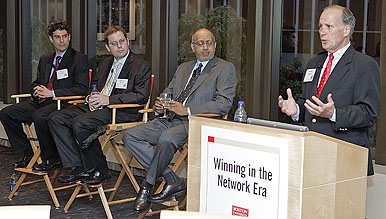Navigating the network era
SMG panel explores the future of business

In the ever-changing business world, the role of a business school changes as well. But as corporations struggle to adapt to the new demands of their industries, how can educational institutions keep up?
Winning in the Network Era, an event cosponsored by BU’s School of Management and the Time Warner corporation, addressed the question in a panel discussion on Wednesday, June 7, at the Time-Life Building in New York. (See video of the event here.) Moderated by Michael Lawson, a senior associate dean at SMG, the panelists were Richard Reidy (SMG’82), the president of DataDirect Technologies; Robert Safian, the executive editor of Fortune magazine; and N. Venkat Venkatraman, the David J. McGrath, Jr. Professor of Management at SMG.
“I want us to get some insight on what we mean by this ‘network era’ that we’re talking about,” Lawson said at the discussion. “How is it different from what came before it? What does winning in it mean?”
Venkatraman, the chairman of SMG’s information systems department, spoke on the history of management study, which he noted is still largely influenced by the ideas developed in the automotive industry. “It’s a firm-centric idea,” he said. “But in this postindustrial age, products are not autonomous entities and business processes are not autonomous activities.”
In the network era, the panelists said, companies have to rethink all the components of their business, from marketing campaigns to internal structure. Reidy noted that his company is realizing that directly marketing its software may not be the best way to reach consumers. Instead, he said, they are thinking about making their Web presence more informational and social. “That’s kind of scary, and nobody knows whether that’s a good idea or not,” Reidy said.
Many companies are facing similar uncertainties, said Safian, who primarily reports on Fortune 5000 companies. “What we see is both great excitement about all this change and what it can do,” he said, “and incredible fear about ‘What does it mean, who’s coming after me, and how do I use it and what can I do?’”
The challenge, the panelists agreed, is for professionals and academics to remain flexible and open to new ideas — many of which, Safian said, come from the bottom up in large corporations. “The lower you are on the totem pole, in some ways the better off you’re going to be in the future,” he said. “I think we have to look at smaller companies and learn from them. We have to break down a lot of our structures that are stuck.”